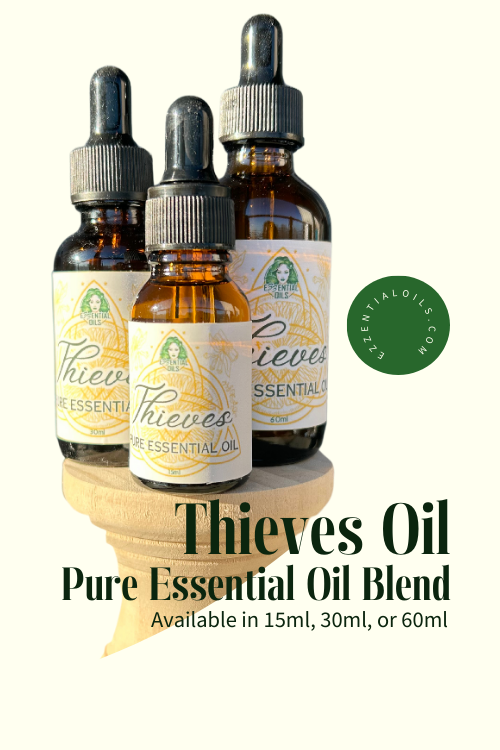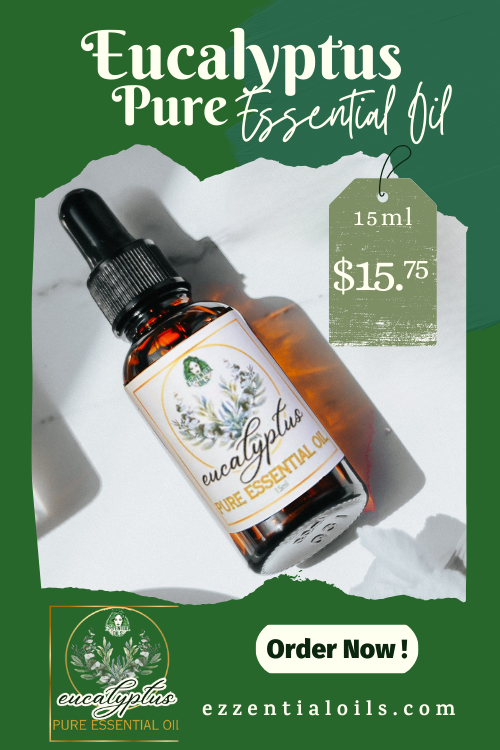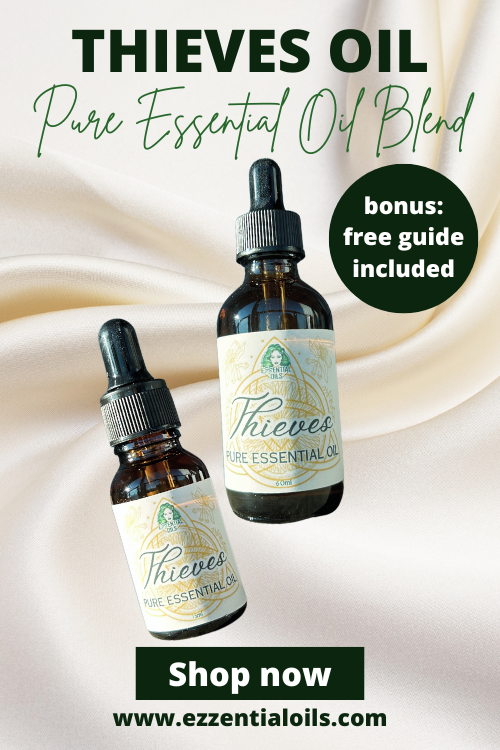Relieve Muscle Pain Naturally With Essential Oils
Muscle pain is a common issue, whether it's from a tough workout, stress, or everyday strain. Essential oils offer a natural, effective way to soothe sore muscles and promote healing. By leveraging the therapeutic properties of these concentrated plant extracts, you can ease discomfort, reduce inflammation, and restore comfort to your body.
How Essential Oils Work to Treat Muscle Pain
Reduce Inflammation:
Inflammation is a natural response to muscle strain or injury, but excessive or prolonged swelling can cause discomfort and delay recovery. Essential oils like peppermint and eucalyptus contain compounds such as menthol and 1,8-cineole, which have potent anti-inflammatory properties. These compounds work by inhibiting inflammatory pathways in the body, reducing redness, swelling, and pain. The cooling sensation provided by peppermint oil also helps to numb the area and alleviate discomfort, making it particularly effective for acute injuries or overuse.
Ease Tension:
Muscle tension often results from stress, poor posture, or overexertion, leading to stiffness and pain. Essential oils like lavender and marjoram are natural muscle relaxants that help ease this tension. Lavender, known for its calming properties, reduces muscle spasms by promoting relaxation and calming the nervous system. Marjoram, sometimes referred to as the "happiness herb," contains antispasmodic compounds that target muscle fibers, releasing tightness and soothing areas prone to cramping or knots.
Boost Circulation:
Poor blood circulation can contribute to muscle stiffness, soreness, and slow recovery. Essential oils such as rosemary and black pepper are excellent for enhancing circulation. Rosemary contains compounds like camphor and cineole, which stimulate blood flow to the affected muscles, delivering oxygen and nutrients essential for healing. Black pepper, a warming oil rich in piperine, not only improves circulation but also helps remove lactic acid buildup, a common cause of post-workout soreness. Enhanced circulation also accelerates the removal of metabolic waste products, aiding in quicker recovery.
Calm the Nervous System:
Pain isn't just physical; it has an emotional and psychological component. Essential oils like bergamot, chamomile, and frankincense help address the emotional side of discomfort by calming the nervous system. Aromatherapy triggers the brain's limbic system, which governs emotions, memory, and behavior, to release neurotransmitters like serotonin and dopamine. This helps to reduce stress, promote relaxation, and improve pain perception. As the body relaxes emotionally, muscles are more likely to release tension, allowing for faster recovery and a sense of overall well-being.
Best Essential Oils for Muscle Pain
Muscle pain can range from mild discomfort to debilitating soreness, but essential oils offer a versatile and natural way to address it. Below, we dive deeper into the benefits of some of the most effective essential oils for relieving muscle pain and how they work to target different aspects of discomfort.
Peppermint Oil:
Peppermint oil is a powerhouse for pain relief. Its high menthol content provides an immediate cooling effect, which soothes inflammation and reduces swelling. This oil also has mild analgesic (pain-relieving) properties that help numb localized pain, making it ideal for acute injuries, overworked muscles, or tension headaches. Additionally, its invigorating aroma can provide an energizing boost, helping you feel refreshed and ready to recover.
Eucalyptus Oil:
Renowned for its anti-inflammatory and analgesic qualities, eucalyptus oil is perfect for reducing pain associated with swelling or inflammation. Its active component, 1,8-cineole, helps to decrease inflammation by acting on cytokines, which are signaling molecules involved in the inflammatory response. Eucalyptus oil also improves circulation, delivering essential nutrients to tired or injured muscles and speeding up the recovery process. Its fresh, camphoraceous scent can clear the mind and provide a cooling sensation to achy areas.
Lavender Oil:
Lavender oil is a gentle yet powerful oil that relaxes both the mind and body. It's particularly effective for muscle spasms and tension caused by stress, as it contains linalool and linalyl acetate, compounds known for their sedative and antispasmodic effects. Lavender also aids in improving sleep quality, which is crucial for overall recovery. Its calming properties make it a go-to choice for addressing muscle pain linked to mental or emotional stress.
Marjoram Oil:
Often referred to as the "herb of happiness," marjoram oil is prized for its muscle-relaxing and anti-spasmodic effects. This oil is ideal for easing chronic muscle stiffness and tension, especially in areas like the shoulders, neck, and lower back. Marjoram also helps improve circulation and soothe nerve pain, making it beneficial for long-term discomfort or conditions like fibromyalgia.
Rosemary Oil:
Rosemary oil is known for its ability to stimulate blood flow and relieve soreness. Its warming and invigorating properties make it an excellent choice for easing stiffness and supporting the recovery of overworked muscles. The camphor in rosemary oil provides a mild analgesic effect, reducing pain while enhancing flexibility and mobility. This oil is especially effective when used before or after physical activity to prevent or alleviate soreness.
Black Pepper Oil:
Black pepper oil is a warming oil that's perfect for reducing stiffness and improving flexibility. Its active component, piperine, stimulates circulation, which helps relax tight muscles and reduces the buildup of lactic acid that can cause soreness after exercise. Black pepper's warming effect makes it ideal for chronic pain or cold-weather aches, and it pairs well with other oils to enhance their effectiveness.
Chamomile Oil:
Chamomile oil, particularly Roman chamomile, is a gentle yet effective remedy for muscle pain. Its anti-inflammatory and antispasmodic properties make it ideal for soothing soreness and easing cramps. Chamomile oil is especially beneficial for individuals with sensitive skin or those seeking a calming remedy for tension. Its sweet, apple-like scent also promotes relaxation and emotional well-being, creating a holistic approach to pain relief.
Methods to Use Essential Oils for Muscle Pain
Massage: Combine essential oils with a carrier oil, like almond or coconut oil, to create a soothing massage blend.
Warm Compress: Apply a warm compress infused with essential oils to the affected area to relax muscles and improve circulation.
Bath Soak: Add essential oils to a warm bath for full-body relief.
Topical Application: Use a roller bottle blend for convenient, targeted application.
Diffusion: Inhale essential oils for emotional and physical relaxation.
Essential Oil Recipes for Muscle Pain Relief
Muscle-Soothing Massage Oil
3 tablespoons of almond oil
10 drops of peppermint oil
8 drops of eucalyptus oil
5 drops of lavender oil
Mix in a clean glass bottle. Massage onto sore areas using circular motions.
Relaxing Muscle Soak
1 cup of Epsom salt
10 drops of marjoram oil
5 drops of rosemary oil
5 drops of chamomile oil
Combine the oils with the Epsom salt. Add to a warm bath and soak for 20 minutes.
Warming Muscle Rub
2 tablespoons of coconut oil
8 drops of black pepper oil
6 drops of ginger oil
6 drops of rosemary oil
Melt the coconut oil and stir in the essential oils. Store in a small jar and apply to muscles as needed.
Cooling Muscle Compress
1 bowl of warm water
5 drops of peppermint oil
5 drops of eucalyptus oil
Add the oils to the water, soak a cloth in the mixture, and apply to the affected area for 10-15 minutes.
Safety Tips for Using Essential Oils
Always dilute essential oils with a carrier oil to prevent skin irritation.
Perform a patch test before applying new blends to ensure there are no allergic reactions.
Avoid contact with sensitive areas, such as the eyes or broken skin.
Consult with a healthcare professional if you are pregnant, nursing, or have underlying health conditions.
By incorporating essential oils into your routine, you can manage muscle pain naturally and effectively. Experiment with the recipes above to find the perfect remedy for your needs and experience the soothing power of aromatherapy.
Please note, the International Federation of Aromatherapists do not recommend that Essential Oils be taken internally, unless under the supervision of a Medical Doctor, who is also qualified in clinical Aromatherapy. In addition, Essential Oils must be properly diluted before use, in order to avoid any damages to property or adverse physical effects (including injury or bodily harm).
This article is for information purposes only. All Ezzential Oils products are for external use only unless otherwise indicated. This information is not intended to diagnose, treat, cure, or prevent any disease, and it should not be used by anyone who is pregnant or under the care of a medical practitioner. Please refer to our policies for further details, and our disclaimer below.
How Essential Oils Work to Treat Muscle Pain
Reduce Inflammation:
Inflammation is a natural response to muscle strain or injury, but excessive or prolonged swelling can cause discomfort and delay recovery. Essential oils like peppermint and eucalyptus contain compounds such as menthol and 1,8-cineole, which have potent anti-inflammatory properties. These compounds work by inhibiting inflammatory pathways in the body, reducing redness, swelling, and pain. The cooling sensation provided by peppermint oil also helps to numb the area and alleviate discomfort, making it particularly effective for acute injuries or overuse.
Ease Tension:
Muscle tension often results from stress, poor posture, or overexertion, leading to stiffness and pain. Essential oils like lavender and marjoram are natural muscle relaxants that help ease this tension. Lavender, known for its calming properties, reduces muscle spasms by promoting relaxation and calming the nervous system. Marjoram, sometimes referred to as the "happiness herb," contains antispasmodic compounds that target muscle fibers, releasing tightness and soothing areas prone to cramping or knots.
Boost Circulation:
Poor blood circulation can contribute to muscle stiffness, soreness, and slow recovery. Essential oils such as rosemary and black pepper are excellent for enhancing circulation. Rosemary contains compounds like camphor and cineole, which stimulate blood flow to the affected muscles, delivering oxygen and nutrients essential for healing. Black pepper, a warming oil rich in piperine, not only improves circulation but also helps remove lactic acid buildup, a common cause of post-workout soreness. Enhanced circulation also accelerates the removal of metabolic waste products, aiding in quicker recovery.
Calm the Nervous System:
Pain isn't just physical; it has an emotional and psychological component. Essential oils like bergamot, chamomile, and frankincense help address the emotional side of discomfort by calming the nervous system. Aromatherapy triggers the brain's limbic system, which governs emotions, memory, and behavior, to release neurotransmitters like serotonin and dopamine. This helps to reduce stress, promote relaxation, and improve pain perception. As the body relaxes emotionally, muscles are more likely to release tension, allowing for faster recovery and a sense of overall well-being.
Best Essential Oils for Muscle Pain
Muscle pain can range from mild discomfort to debilitating soreness, but essential oils offer a versatile and natural way to address it. Below, we dive deeper into the benefits of some of the most effective essential oils for relieving muscle pain and how they work to target different aspects of discomfort.
Peppermint Oil:
Peppermint oil is a powerhouse for pain relief. Its high menthol content provides an immediate cooling effect, which soothes inflammation and reduces swelling. This oil also has mild analgesic (pain-relieving) properties that help numb localized pain, making it ideal for acute injuries, overworked muscles, or tension headaches. Additionally, its invigorating aroma can provide an energizing boost, helping you feel refreshed and ready to recover.
Eucalyptus Oil:
Renowned for its anti-inflammatory and analgesic qualities, eucalyptus oil is perfect for reducing pain associated with swelling or inflammation. Its active component, 1,8-cineole, helps to decrease inflammation by acting on cytokines, which are signaling molecules involved in the inflammatory response. Eucalyptus oil also improves circulation, delivering essential nutrients to tired or injured muscles and speeding up the recovery process. Its fresh, camphoraceous scent can clear the mind and provide a cooling sensation to achy areas.
Lavender Oil:
Lavender oil is a gentle yet powerful oil that relaxes both the mind and body. It's particularly effective for muscle spasms and tension caused by stress, as it contains linalool and linalyl acetate, compounds known for their sedative and antispasmodic effects. Lavender also aids in improving sleep quality, which is crucial for overall recovery. Its calming properties make it a go-to choice for addressing muscle pain linked to mental or emotional stress.
Marjoram Oil:
Often referred to as the "herb of happiness," marjoram oil is prized for its muscle-relaxing and anti-spasmodic effects. This oil is ideal for easing chronic muscle stiffness and tension, especially in areas like the shoulders, neck, and lower back. Marjoram also helps improve circulation and soothe nerve pain, making it beneficial for long-term discomfort or conditions like fibromyalgia.
Rosemary Oil:
Rosemary oil is known for its ability to stimulate blood flow and relieve soreness. Its warming and invigorating properties make it an excellent choice for easing stiffness and supporting the recovery of overworked muscles. The camphor in rosemary oil provides a mild analgesic effect, reducing pain while enhancing flexibility and mobility. This oil is especially effective when used before or after physical activity to prevent or alleviate soreness.
Black Pepper Oil:
Black pepper oil is a warming oil that's perfect for reducing stiffness and improving flexibility. Its active component, piperine, stimulates circulation, which helps relax tight muscles and reduces the buildup of lactic acid that can cause soreness after exercise. Black pepper's warming effect makes it ideal for chronic pain or cold-weather aches, and it pairs well with other oils to enhance their effectiveness.
Chamomile Oil:
Chamomile oil, particularly Roman chamomile, is a gentle yet effective remedy for muscle pain. Its anti-inflammatory and antispasmodic properties make it ideal for soothing soreness and easing cramps. Chamomile oil is especially beneficial for individuals with sensitive skin or those seeking a calming remedy for tension. Its sweet, apple-like scent also promotes relaxation and emotional well-being, creating a holistic approach to pain relief.
Methods to Use Essential Oils for Muscle Pain
Massage: Combine essential oils with a carrier oil, like almond or coconut oil, to create a soothing massage blend.
Warm Compress: Apply a warm compress infused with essential oils to the affected area to relax muscles and improve circulation.
Bath Soak: Add essential oils to a warm bath for full-body relief.
Topical Application: Use a roller bottle blend for convenient, targeted application.
Diffusion: Inhale essential oils for emotional and physical relaxation.
Essential Oil Recipes for Muscle Pain Relief
Muscle-Soothing Massage Oil
3 tablespoons of almond oil
10 drops of peppermint oil
8 drops of eucalyptus oil
5 drops of lavender oil
Mix in a clean glass bottle. Massage onto sore areas using circular motions.
Relaxing Muscle Soak
1 cup of Epsom salt
10 drops of marjoram oil
5 drops of rosemary oil
5 drops of chamomile oil
Combine the oils with the Epsom salt. Add to a warm bath and soak for 20 minutes.
Warming Muscle Rub
2 tablespoons of coconut oil
8 drops of black pepper oil
6 drops of ginger oil
6 drops of rosemary oil
Melt the coconut oil and stir in the essential oils. Store in a small jar and apply to muscles as needed.
Cooling Muscle Compress
1 bowl of warm water
5 drops of peppermint oil
5 drops of eucalyptus oil
Add the oils to the water, soak a cloth in the mixture, and apply to the affected area for 10-15 minutes.
Safety Tips for Using Essential Oils
Always dilute essential oils with a carrier oil to prevent skin irritation.
Perform a patch test before applying new blends to ensure there are no allergic reactions.
Avoid contact with sensitive areas, such as the eyes or broken skin.
Consult with a healthcare professional if you are pregnant, nursing, or have underlying health conditions.
By incorporating essential oils into your routine, you can manage muscle pain naturally and effectively. Experiment with the recipes above to find the perfect remedy for your needs and experience the soothing power of aromatherapy.
Safety Information
Please note, the International Federation of Aromatherapists do not recommend that Essential Oils be taken internally, unless under the supervision of a Medical Doctor, who is also qualified in clinical Aromatherapy. In addition, Essential Oils must be properly diluted before use, in order to avoid any damages to property or adverse physical effects (including injury or bodily harm).
This article is for information purposes only. All Ezzential Oils products are for external use only unless otherwise indicated. This information is not intended to diagnose, treat, cure, or prevent any disease, and it should not be used by anyone who is pregnant or under the care of a medical practitioner. Please refer to our policies for further details, and our disclaimer below.













